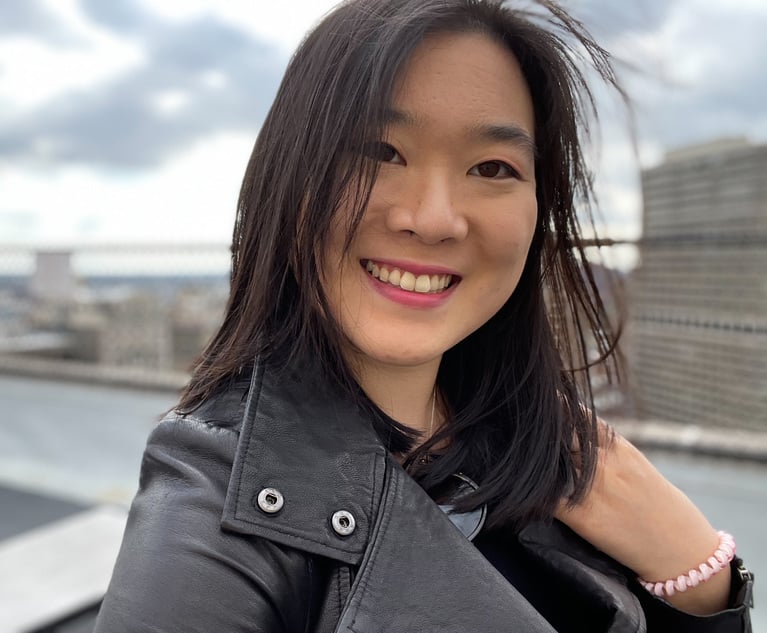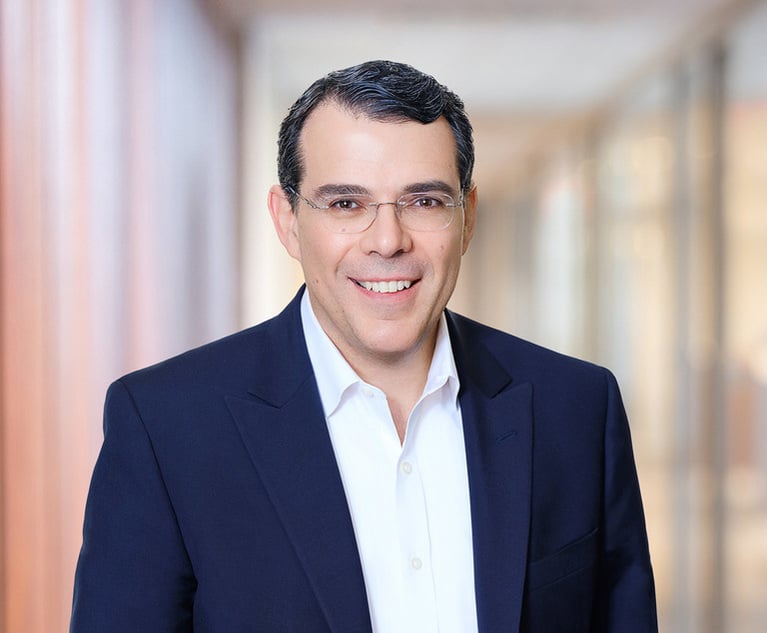 JR Morgan, with Shearman & Sterling.
JR Morgan, with Shearman & Sterling.On the Rise 2018: J.R. Morgan
J.R. Morgan, counsel, Sherman & Sterling
August 31, 2018 at 06:00 AM
5 minute read
J.R. Morgan, counsel, Sherman & Sterling
Experience:
- Sherman & Sterling, 2018-present
- Andrews Kurth Kenyon, 2017-2018
- Morgan, 2013-2017
- Schulte Roth & Zabel, 2008-2012
- U.S. Court of Appeals, Ninth Circuit, 2007
Education:
- UCLA School of Law, 2009
- Evergreen State College, B.S., B.A. 2001/'02
What drew you to a career in law?
I started a couple of businesses in college that lead me to an interest in business law, so I enrolled in a few pre-law courses. That introduced me to Professor Jose Gomez, a lawyer who worked closely with Caser Chavez. He inspired in me a respect for the social importance of the law as well as excitement about the potential breadth and value of a legal education. I doubt I would have found the law without a few passionate and inspiring professors like Professor Gomez.
Have you set a specific goal that you want to achieve in the next year?
Other than getting to the gym? So far this year my focus has been integrating fully with my new firm, so I have been focused more internally, visiting our Silicon Valley, New York, London and Hong Kong offices. For the next year, I want to focus more locally and externally, introducing more Texans to our firm which has recently entered the market here.
What has been your proudest career moment and your biggest hurdle?
The biggest hurdle was in the first year of starting my law firm, when I had expenses but no income (and not a ton of savings) and it was hard to drown out the naysayers. My proudest moment was that same year when I landed my first large client, ensuring the firm would succeed. I could not have achieved that without the help of a half dozen or so lawyers running small law firms that gave me some much needed advice and support; don't under-estimate the value of your local bar.
Where do you fit on a 1-10 work-life balance scale with 10 being nirvana? Please explain.
I would say an 8.5? I get to do interesting and sophisticated work (launching venture capital funds), around a great group of lawyers, in my favorite city. I don't think I am alone in our profession in wishing I had a bit more personal time, but I really can't complain too much since: (i) my work life balance is mostly due to my own choices and priorities, and (ii) I just got back from a pro bono trip to Tanzania, fully supported by my firm, where we worked with Lawyers Without Borders to give support to the Tanzanian criminal justice system. So maybe I should revise that to a 9.9?
What is the top quality that you've used to succeed in the profession?
Diligence.
Who is your favorite mentor and why?
My mother. She worked hard her entire life, always gives more than she takes and never shy at calling “bull” anywhere she sees it. She also homeschooled me most of my life, for which I am very grateful.
What's the best advice anyone has ever given you?
“Know what you know and what you do not know.” I think it is easy, especially for more junior attorneys, to either underestimate or overestimate the extent of their knowledge about particular areas of the law, and neither is positive for their career. Law is a knowledge based business and it is important that you both have a strong knowledge base in a definably area and project confidence (both to other lawyers and to clients) about that subject matter knowledge without overstepping and losing your credibility. If you don't know what you are an expert in, you can bet others don't either, and that makes it harder to build a practice.
What trends are you observing in the profession that you're excited about?
I think the application of new technologies, including artificial intelligence, to legal problems and legal practice has the potential to be a tool to better leverage attorney value that will make the profession more efficient and ensure its continued relevance, as well as improving overall satisfaction and experience for both clients and attorneys.
What is the greatest challenge you see for the legal profession?
The continued consolidation of large law firms across geographic markets, combined with the increasing efficiencies brought to the field by the integration of new technologies may continue to reduce the demand for overall headcount of “big law” attorneys (and possibly, firms). Large law firms in particular will likely need to reconfigure their recruitment, training and retention assumptions for an even more selective and long-term approach. Law schools may be forced to reconfigure their cost structure and curriculum. That is a lot of change that could need to happen fairly quickly.
This content has been archived. It is available through our partners, LexisNexis® and Bloomberg Law.
To view this content, please continue to their sites.
Not a Lexis Subscriber?
Subscribe Now
Not a Bloomberg Law Subscriber?
Subscribe Now
NOT FOR REPRINT
© 2024 ALM Global, LLC, All Rights Reserved. Request academic re-use from www.copyright.com. All other uses, submit a request to [email protected]. For more information visit Asset & Logo Licensing.
You Might Like
View All
Get to Know Texas Lawyer's Attorney of the Year Finalists


With a 7-Figure Book Deal and TV Adaptation on the Way, This Dechert Associate Remains Committed to Her Day Job

As New Chair Takes Reins of Winston, He Wants to Do Things a Little Differently
6 minute readTrending Stories
- 1Gibson Dunn Sued By Crypto Client After Lateral Hire Causes Conflict of Interest
- 2Trump's Solicitor General Expected to 'Flip' Prelogar's Positions at Supreme Court
- 3Pharmacy Lawyers See Promise in NY Regulator's Curbs on PBM Industry
- 4Outgoing USPTO Director Kathi Vidal: ‘We All Want the Country to Be in a Better Place’
- 5Supreme Court Will Review Constitutionality Of FCC's Universal Service Fund
Who Got The Work
Michael G. Bongiorno, Andrew Scott Dulberg and Elizabeth E. Driscoll from Wilmer Cutler Pickering Hale and Dorr have stepped in to represent Symbotic Inc., an A.I.-enabled technology platform that focuses on increasing supply chain efficiency, and other defendants in a pending shareholder derivative lawsuit. The case, filed Oct. 2 in Massachusetts District Court by the Brown Law Firm on behalf of Stephen Austen, accuses certain officers and directors of misleading investors in regard to Symbotic's potential for margin growth by failing to disclose that the company was not equipped to timely deploy its systems or manage expenses through project delays. The case, assigned to U.S. District Judge Nathaniel M. Gorton, is 1:24-cv-12522, Austen v. Cohen et al.
Who Got The Work
Edmund Polubinski and Marie Killmond of Davis Polk & Wardwell have entered appearances for data platform software development company MongoDB and other defendants in a pending shareholder derivative lawsuit. The action, filed Oct. 7 in New York Southern District Court by the Brown Law Firm, accuses the company's directors and/or officers of falsely expressing confidence in the company’s restructuring of its sales incentive plan and downplaying the severity of decreases in its upfront commitments. The case is 1:24-cv-07594, Roy v. Ittycheria et al.
Who Got The Work
Amy O. Bruchs and Kurt F. Ellison of Michael Best & Friedrich have entered appearances for Epic Systems Corp. in a pending employment discrimination lawsuit. The suit was filed Sept. 7 in Wisconsin Western District Court by Levine Eisberner LLC and Siri & Glimstad on behalf of a project manager who claims that he was wrongfully terminated after applying for a religious exemption to the defendant's COVID-19 vaccine mandate. The case, assigned to U.S. Magistrate Judge Anita Marie Boor, is 3:24-cv-00630, Secker, Nathan v. Epic Systems Corporation.
Who Got The Work
David X. Sullivan, Thomas J. Finn and Gregory A. Hall from McCarter & English have entered appearances for Sunrun Installation Services in a pending civil rights lawsuit. The complaint was filed Sept. 4 in Connecticut District Court by attorney Robert M. Berke on behalf of former employee George Edward Steins, who was arrested and charged with employing an unregistered home improvement salesperson. The complaint alleges that had Sunrun informed the Connecticut Department of Consumer Protection that the plaintiff's employment had ended in 2017 and that he no longer held Sunrun's home improvement contractor license, he would not have been hit with charges, which were dismissed in May 2024. The case, assigned to U.S. District Judge Jeffrey A. Meyer, is 3:24-cv-01423, Steins v. Sunrun, Inc. et al.
Who Got The Work
Greenberg Traurig shareholder Joshua L. Raskin has entered an appearance for boohoo.com UK Ltd. in a pending patent infringement lawsuit. The suit, filed Sept. 3 in Texas Eastern District Court by Rozier Hardt McDonough on behalf of Alto Dynamics, asserts five patents related to an online shopping platform. The case, assigned to U.S. District Judge Rodney Gilstrap, is 2:24-cv-00719, Alto Dynamics, LLC v. boohoo.com UK Limited.
Featured Firms
Law Offices of Gary Martin Hays & Associates, P.C.
(470) 294-1674
Law Offices of Mark E. Salomone
(857) 444-6468
Smith & Hassler
(713) 739-1250






